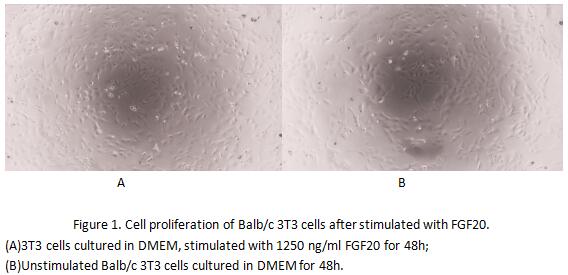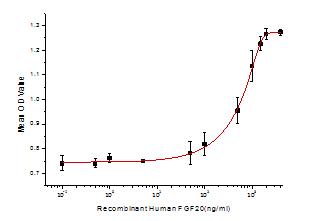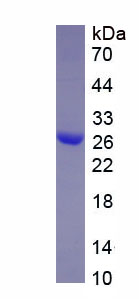
Details
ACTIVITY TEST
Buffer Formulation 20mM Tris, 150mM NaCl, pH8.0, containing 1mM EDTA, 1mM DTT, 0.01% SKL, 5% Trehalose and Proclin300. Traits Freeze-dried powder Purity > 90% Isoelectric Point 8.9 Applications Cell culture; Activity Assays.

Fibroblast growth factor 20 (FGF20) is a member of the fibroblast growth factor family. The fibroblast growth factors possess broad mitogenic and cell survival activities, and are involved in a variety of biological processes including embryonic development, cell growth, morphogenesis, tissue repair, tumor growth and invasion. A proliferation assay was conducted to detect the bioactivity of recombinant human FGF20 using Balb/c 3T3 cells. Briefly, 3T3 cells were seeded into triplicate wells of 96-well plates at a density of 4,000 cells/well and allowed to attach overnight, then the medium was replaced with various concentrations of FGF20 diluted with serum-free standard DMEM. After incubated for 48h, cells were observed by inverted microscope and cell proliferation was measured by Cell Counting Kit-8(CCK-8). Briefly, 10 µl of CCK-8 solution was added to each well of the plate, then the absorbance at 450 nm was measured using a microplate reader after incubating the plate for 1-4 hours at 37°C. Proliferation of Balb/c 3T3 cells after incubation with FGF20 for 48h observed by inverted microscope was shown in Figure1. Cell viability was assessed by CCK-8(Cell Counting Kit-8 ) assay after incubation with recombinant FGF20 for 48h. The result was shown in Figure2. It was obvious that FGF20 significantly increased cell viability of 3T3 cells. The ED50 of recombinant human FGF20 is 628ng/ml.

Figure 2. The dose-effect curve of FGF20 on Balb/c 3T3 cells.
USAGE
Reconstitute in 20mM Tris, 150mM NaCl (PH8.0) to a concentration of 0.1-1.0 mg/mL. Do not vortex.
STORAGE
Avoid repeated freeze/thaw cycles. Store at 2-8°C for one month. Aliquot and store at -80°C for 12 months.
STABILITY
The thermal stability is described by the loss rate. The loss rate was determined by accelerated thermal degradation test, that is, incubate the protein at 37°C for 48h, and no obvious degradation and precipitation were observed. The loss rate is less than 5% within the expiration date under appropriate storage condition.
Image

Figure. SDS-PAGE
Partial purchase records(bought amounts latest0)
User Comment(Total0User Comment Num)
- No comment


 +86 571 56623320
+86 571 56623320




